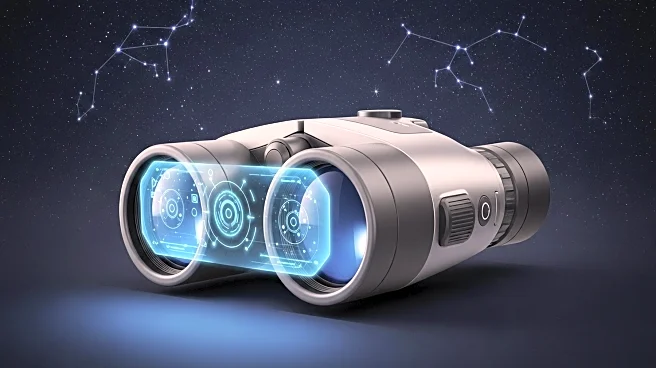What's Happening?
Unistellar has introduced its new Envision smart binoculars, which utilize augmented reality to provide real-time information on observed objects. These binoculars, developed through a successful Kickstarter campaign, offer features such as GPS and geospatial data integration, allowing users to identify stars and terrestrial landmarks. The binoculars are available for pre-order at a discounted price of $999, down from the full price of $1,499. The Envision binoculars are designed to enhance the stargazing experience by overlaying graphics onto the night sky and landscape, providing a sense of discovery and exploration.
Why It's Important?
The launch of the Envision smart binoculars represents a significant advancement in consumer optics technology, merging augmented reality with traditional binocular functions. This innovation can transform the way enthusiasts and professionals engage with astronomy and outdoor exploration, offering a more interactive and informative experience. The ability to identify celestial and terrestrial objects in real-time can enhance educational activities, making astronomy more accessible and engaging for a broader audience. The product's integration of technology and optics may set a precedent for future developments in the field.
What's Next?
Unistellar plans to expand its database to include over 1 million terrestrial points of interest, further enriching the user experience. As the product becomes available, it is expected to attract interest from educators, tour groups, and astronomy clubs, who can utilize its features for guided observations and educational programs. The success of the Envision binoculars may encourage other manufacturers to explore similar technological integrations, potentially leading to a new market segment in smart optics.
Beyond the Headlines
The introduction of augmented reality in consumer optics raises questions about the future of traditional stargazing and exploration. While technology enhances the experience, it also shifts the focus from personal observation to data-driven interaction. This development may influence how future generations perceive and engage with the natural world, balancing technological convenience with the intrinsic value of direct observation. Ethical considerations regarding data privacy and the commercialization of natural experiences may also emerge as the technology becomes more widespread.









